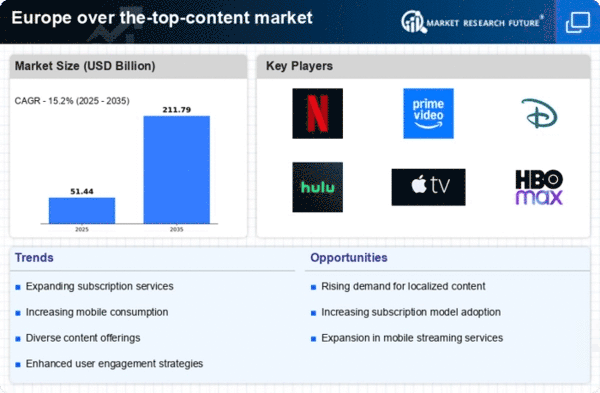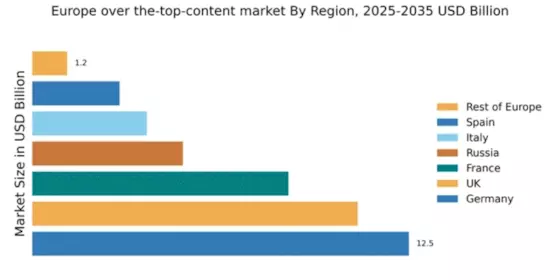Impact of Economic Factors
Economic factors play a crucial role in shaping the over the top content market in Europe. Fluctuations in disposable income can directly affect consumer spending on entertainment services. In recent years, economic growth in several European countries has led to an increase in disposable income, which may correlate with higher subscription rates for streaming services. Additionally, the economic landscape influences advertising revenues, as brands allocate budgets based on consumer spending patterns. As the economy continues to evolve, the over the top content market must remain agile, adapting to changes in consumer behavior and economic conditions to sustain growth.
Changing Consumer Preferences
Consumer preferences in Europe are shifting dramatically, influencing the over the top content market. Viewers are increasingly favoring on-demand content over traditional broadcasting, seeking flexibility in their viewing habits. This trend is reflected in the growing popularity of binge-watching, where entire seasons of shows are consumed in one sitting. Recent surveys indicate that around 70% of European consumers prefer streaming services that offer a wide variety of content, including international films and series. This shift is prompting providers to diversify their offerings, leading to an increase in subscription options and pricing strategies. As consumer preferences continue to evolve, the over the top content market must adapt to meet the demands of a more discerning audience.
Regulatory Environment and Compliance
The regulatory environment surrounding the over the top content market in Europe is evolving, impacting how services operate. Governments are increasingly focusing on content regulation, data protection, and consumer rights, which can influence market dynamics. For example, the implementation of the General Data Protection Regulation (GDPR) has necessitated that streaming services enhance their data privacy measures, potentially increasing operational costs. However, compliance with these regulations can also build consumer trust, which is essential for long-term success. As regulatory frameworks continue to develop, the over the top content market must navigate these challenges while ensuring compliance to maintain a competitive edge.
Competitive Landscape and Market Entry
The competitive landscape of the over the top content market in Europe is becoming increasingly dynamic. New entrants are consistently emerging, challenging established players with innovative content and pricing strategies. This influx of competition is driving down subscription prices, making services more accessible to a broader audience. For instance, the average monthly subscription fee for streaming services in Europe has decreased by approximately 15% over the past two years, reflecting the intense competition. Additionally, partnerships between local content creators and international platforms are becoming more common, enhancing the diversity of available content. As competition intensifies, the over the top content market is likely to witness further innovations and improvements in service delivery.
Technological Advancements in Streaming
The over the top content market in Europe is experiencing a surge due to rapid technological advancements in streaming services. Enhanced internet infrastructure, particularly the rollout of 5G networks, is facilitating faster and more reliable streaming experiences. This technological evolution allows consumers to access high-definition content seamlessly, which is crucial for retaining subscribers. Moreover, the integration of artificial intelligence in content recommendation systems is improving user engagement, leading to increased viewing times. According to recent data, the number of broadband subscriptions in Europe has reached approximately 90 million, indicating a robust foundation for the over the top content market. As technology continues to evolve, it is likely that new innovations will further enhance the viewing experience, driving growth in this sector.


















